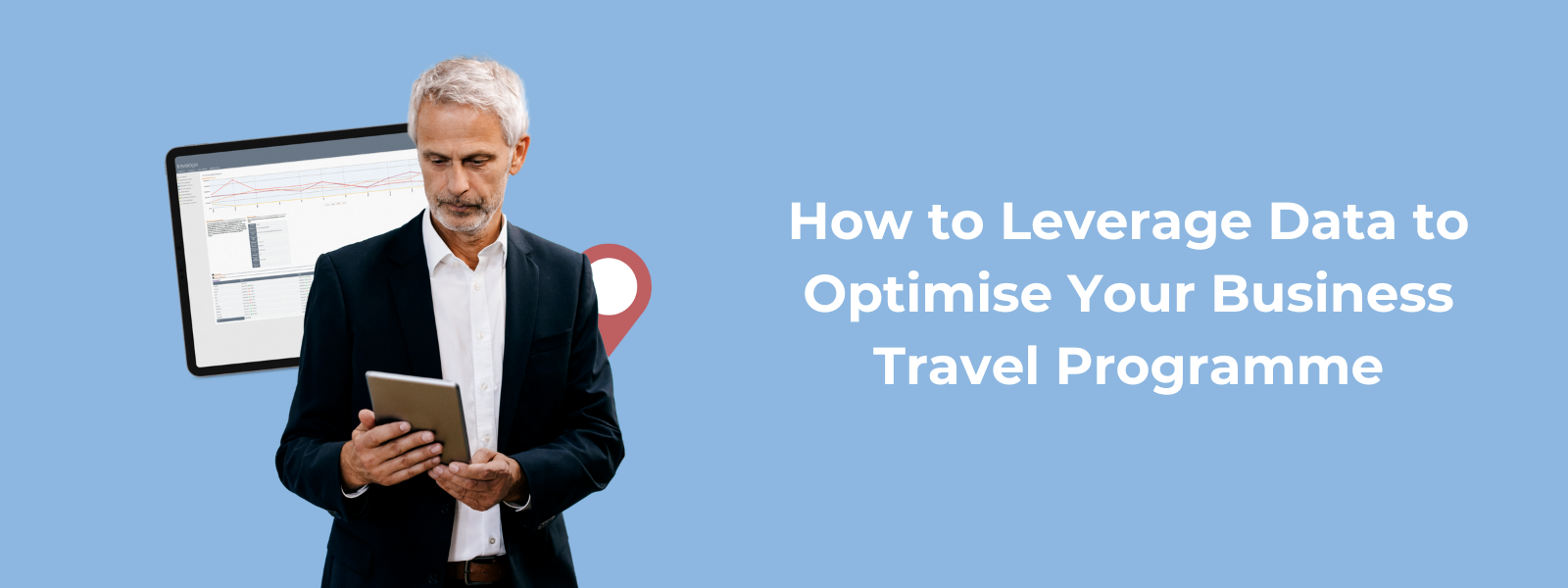Today’s companies rely on efficient travel programmes to connect with clients, explore new markets, and maintain operations. However, managing a travel programme effectively requires more than just booking flights and hotels.
Data plays a crucial role in optimising these programmes, improving cost-efficiency, and enhancing traveller satisfaction. In this blog, we will explore how leveraging data can help businesses optimise their travel programmes for better results.
Why data matters in business travel
Data-driven decisions are at the heart of modern business strategies, and travel management is no exception. The vast amount of information generated through travel bookings, expenses, and traveller preferences provides valuable insights that can help businesses streamline their travel programmes. From controlling costs to improving compliance, data offers the means to make informed, strategic choices.
The challenge for many businesses lies in understanding how to collect, analyse, and act upon this data effectively. By doing so, companies can not only save money but also improve the overall travel experience for employees.
Understanding travel patterns and trends
One of the first steps in leveraging data to optimise your business travel programme is identifying key travel patterns. This includes analysing frequent destinations, common travel times, and preferred airlines or hotels. Understanding these trends allows businesses to negotiate better deals with travel suppliers and streamline booking processes.
For example, if data reveals that most business trips occur during the same months each year, the company can negotiate bulk discounts with airlines or hotels. Similarly, identifying preferred suppliers can lead to partnerships that offer better rates and services tailored to your business’s needs.
Moreover, tracking travel patterns can help businesses assess the necessity of certain trips, reducing unnecessary travel and associated costs.
Reducing costs through data insights
Data offers unparalleled opportunities to identify cost-saving measures in business travel. By analysing spending data, companies can pinpoint areas where costs can be reduced, such as:
- Identifying overspend: Data can reveal where employees might be exceeding travel budgets, allowing companies to adjust policies or implement stricter approval processes.
- Supplier analysis: Detailed data on spending with airlines, hotels, and car hire companies enables businesses to assess where they can negotiate better rates or switch to more cost-effective providers.
- Expense management: Using data to analyse expense reports can highlight any discrepancies between policy and actual spending, ensuring compliance and reducing instances of overpayment.
With the right data tools in place, businesses can monitor travel expenses in real-time, quickly identifying and addressing any cost overruns.
Enhancing policy compliance
A well-defined travel policy is essential for managing a successful business travel programme. However, ensuring employees follow the set guidelines can be challenging. Data analytics can play a significant role in boosting compliance with travel policies.
By tracking bookings and expenses, businesses can quickly identify areas where policies are not being followed. Whether it’s booking outside of approved channels, selecting non-compliant suppliers, or exceeding budgetary limits, data can highlight these issues in real-time.
Moreover, presenting employees with personalised data on their travel habits, including areas where they may be exceeding limits or deviating from policy, can encourage better compliance. Informed travellers are more likely to make decisions that align with company policies.
Improving traveller experience
While cost control is a primary concern for many businesses, ensuring a positive experience for employees is equally important. Data can be a powerful tool in creating a more personalised, comfortable travel experience.
Through data analysis, businesses can identify traveller preferences, such as favoured airlines, seating arrangements, or hotels. By accommodating these preferences within policy limits, companies can improve employee satisfaction without incurring additional costs.
Furthermore, data can help companies predict and mitigate common travel issues, such as delays or cancellations, ensuring that employees face minimal disruption during their trips. The smoother the travel experience, the more productive employees will be during their business trips.
Sustainability and data
Sustainability is becoming a growing concern in corporate travel. With increasing awareness of carbon footprints, businesses are looking for ways to minimise their environmental impact. Data can support these efforts by helping companies track their carbon emissions from travel and identify opportunities for reduction.
By analysing travel data, businesses can see where they can reduce flights, encourage train travel, or implement video conferencing as an alternative to in-person meetings. Data can also assist in choosing more sustainable suppliers, such as airlines with lower emissions or eco-friendly hotels.
Using technology to leverage data
To effectively leverage data, businesses need the right tools and technology. Travel management software (TMS) and expense management platforms are essential for gathering, analysing, and acting on data. These tools provide businesses with real-time insights into travel spending, compliance, and traveller behaviour.
Integrating your travel programme with data analytics platforms allows for automated reporting, which can be tailored to highlight the key metrics that matter most to your business. Regular reports can help travel managers and decision-makers stay on top of trends and make proactive adjustments to the travel programme.
Optimise your business travel programme
Businesses cannot afford to overlook the importance of leveraging data in their travel programmes. From cost savings and improved compliance to enhanced traveller experiences and sustainability, the benefits of using data are vast. By adopting a data-focused approach, companies can ensure their business travel programmes are optimised for efficiency, cost-effectiveness, and employee satisfaction.
As awareness of the power of data in travel management grows, now is the perfect time for businesses to explore how they can better utilise the information at their disposal. In the long run, this will lead to a more streamlined, cost-effective, and sustainable travel programme, benefiting both the company and its employees.
Get in touch with our team today and discover how our data can help optimise your business travel programme.
